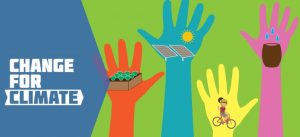The inevitable effects of global warming and climate change are no longer limited to
Africa, or the West for that matter. We cannot brush it off and turn a blind
eye to a reality that needs to be addressed soon.
Africa, or the West for that matter. We cannot brush it off and turn a blind
eye to a reality that needs to be addressed soon.
The Global Climate Risk Index 2019 was presented at the United Nations
Environmental Summit, Poland. It’s an Index that studies extreme weather events
and their losses across the globe.
The main aim of the index is to give countries a
warning ahead of time to be prepared for more frequent and severe climate
disasters.
Environmental Summit, Poland. It’s an Index that studies extreme weather events
and their losses across the globe.
The main aim of the index is to give countries a
warning ahead of time to be prepared for more frequent and severe climate
disasters.
According
to the latest report based on 2017 data, Sri Lanka is second only to Puerto Rico in the list of countries most affected by climate change.
to the latest report based on 2017 data, Sri Lanka is second only to Puerto Rico in the list of countries most affected by climate change.
What’s even
more alarming was that we were placed 4th by the Index in the previous year, and 98th the year
before. We’ve topped the charts faster than any other country in the world.
more alarming was that we were placed 4th by the Index in the previous year, and 98th the year
before. We’ve topped the charts faster than any other country in the world.
The strong
monsoon rains in the southwestern regions of Sri Lanka that caused heavy
landslides and floods in May 2017 had been considered by the Index. Accordingly,
this was the worst rain in an Indian Ocean island since 2003 – resulting in a
death toll of over 200, affecting 12 districts, and displacing over 600,000 individuals.
monsoon rains in the southwestern regions of Sri Lanka that caused heavy
landslides and floods in May 2017 had been considered by the Index. Accordingly,
this was the worst rain in an Indian Ocean island since 2003 – resulting in a
death toll of over 200, affecting 12 districts, and displacing over 600,000 individuals.
 The year
The yearbefore, a landslide disaster followed by heavy rains buried 3 villages in
Aranayake with its 127 people. It also affected 22 of the 25 districts in the
country. A recurring trend to these disasters can further be observed as heavy storms hit the North in late December 2018. This rainfall was the highest
recorded in a single day since 1983.
According
to JBA Risk Management, floods can commonly be observed in
Sri Lanka during monsoon seasons. However, they have now turned more intense –
affecting more people every year.
to JBA Risk Management, floods can commonly be observed in
Sri Lanka during monsoon seasons. However, they have now turned more intense –
affecting more people every year.
 The Global
The GlobalClimate Risk Index goes on to prove that developing countries are more affected
than the industrialized countries by climate change. 8 out of 10 most affected
countries in the list were underdeveloped countries.
While our leaders continue to ignore the obvious, we as citizens who suffer the biggest consequences, shouldn’t. Reducing our individual carbon emissions by switching to a sustainable, more eco-friendly lifestyle is a good place to start.
Written by:
Written by:



Thank you for taking the effort to bring such an alarming fact to light.
Very well written article. It was awesome article to read. Complete rich content and fully informative. I am impressed by the details that you have shared in this post and It reveals how nicely you understand this subject. I would like to thanks for sharing this article here. Carton Formers.
Thankyou very much!
This information is meaningful and magnificent which you have shared here. I am impressed by the details that you have shared in this post and It reveals how nicely you understand this subject. I would like to thanks for sharing this article here. Learner Permit Practice Test In USA.
The article you have shared here is very informative and the points you have mentioned are very helpful. I am glad that I came to see this, I really loved it. Complete rich content and fully informative. Thank you so much. African American Community in New York.
It was awesome article to read. Very well written article. Complete rich content and fully informative. I read this article; it is really informative one. Your way of writing and making things clear is very impressive. Thanking you for such an informative article. Black Press in New York.
This information is meaningful and magnificent which you have shared here. Your article isn’t only useful but it is additionally really informative. Thank you because you have been willing to share information with us. AFA Systems Ltd..